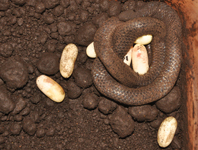Abstract
We reassessed the systematics of the Indian (semi)fossorial snake Xylophis perroteti (Duméril, Bibron & Duméril, 1854) based on morphological and DNA sequence data for type, historical, and new specimens. A population from the Anamalai Hills is distinct from broadly topotypic X. perroteti from the Nilgiri Hills (from which they are separated geographically by the lowland Palghat Gap) on the basis of both external morphology and DNA sequence data. We describe the Anamalai form as a new species, Xylophis mosaicus sp. nov. The new species is more closely related to X. perroteti than to X. stenorhynchus and X. captaini. A new key to identify the species of Xylophis is presented.
References
Arévalo, E., Davis, S.K. & Sites, J.W. (1994) Mitochondrial DNA sequence divergence and phylogenetic relationships among eight chromosome races of the Sceloporus grammicus Complex (Phrynosomatidae) in Central Mexico. Systematic Biology, 43 (3), 387–418.
https://doi.org/10.1093/sysbio/43.3.387
Beddome, R.H. (1878) Description of a new genus of snakes of the family Calamaridae, from Southern India. Proceedings of the Zoological Society London, 46 (1), 576.
https://doi.org/10.1111/j.1469-7998.1878.tb07988.x
Boulenger, G.A. (1890) The Fauna of British India, Including Ceylon and Burma. Reptilia and Batrachia. Taylor & Francis, London, xviii + 541 pp.
https://doi.org/10.5962/bhl.title.57017
Burbrink, F.T., Lawson, R. & Slowinski, J.B. (2000) Mitochondrial DNA phylogeography of the polytypic North American rat snake (Elaphe obsoleta): a critique of the subspecies concept. Evolution, 54 (6), 2107–2118.
https://doi.org/10.1111/j.0014-3820.2000.tb01253.x
Deepak, V., Ruane, S. & Gower, D.J. (2018) A new subfamily of fossorial colubroid snakes from the Western Ghats of peninsular India. Journal of Natural History, 52 (45–46), 2919–2934.
https://doi.org/10.1080/00222933.2018.1557756
Duméril, A.M.C., Bibron, G. & Duméril, A.H.A. (1854) Erpétologie générale ou Histoire Naturelle complète des Reptiles. Vol. 7. Partie 1. Roret, Paris, xvi + 780 pp.
https://doi.org/10.5962/bhl.title.100816
Gower, D.J., Kupfer, A., Oommen, O.V., Himstedt, W., Nussbaum, R.A., Loader, S.P., Presswell, B., Müller, H., Krishna, S.B., Boistel, R. & Wilkinson, M. (2002) A molecular phylogeny of ichthyophiid caecilians (Amphibia: Gymnophiona: Ichthyophiidae): out of India or out of South East Asia?. Proceedings of the Royal Society of London, Series B, Biological Sciences, 269 (1500), 1563–1569.
https://doi.org/10.1098/rspb.2002.2050
Gower, D.J. & Winkler, J.D. (2007) Taxonomy of the Indian snake Xylophis Beddome (Serpentes: Caenophidia), with description of a new species. Hamadryad, 31 (2), 315–329.
Günther, A. (1858) Catalogue of Colubrine snakes of the British Museum. the Trustees of the British Museum, London, XVI + 281 pp.
Günther, A. (1864) The Reptiles of British India. Taylor & Francis, London, xxvii + 452 pp., XXVI pls.
Higgins, D., Thompson, J., Gibson, T. Thompson, J.D., Higgins, D.G. & Gibson, T.J. (1994) CLUSTAL W: improving the sensitivity of progressive multiple sequence alignment through sequence weighting, position-specific gap penalties and weight matrix choice. Nucleic Acids Research, 22 (22), 4673–4680.
https://doi.org/10.1093/nar/22.22.4673
Lanfear, R., Calcott, B., Ho, S.Y.W. & Guindon, S. (2012) Partitionfinder: combined selection of partitioning schemes and substitution models for phylogenetic analyses. Molecular Biology and Evolution, 29 (6), 1695–1701.
https://doi.org/10.1093/molbev/mss020
Lawson, R., Slowinski, J.B., Crother, B.I. & Burbrink, F.T. (2005) Phylogeny of the Colubroidea (Serpentes): new evidence from mitochondrial and nuclear genes. Molecular Phylogenetics and Evolution, 37 (2), 581–601.
https://doi.org/10.1016/j.ympev.2005.07.016
Miller, M.A., Pfeiffer, W. & Schwartz, T. (2010) Creating the CIPRES Science Gateway for inference of large phylogenetic trees. In: Proceedings of the Gateway Computing Environments Workshop (GCE), New Orleans, Louisiana, 14 November 2010, pp. 1–8.
https://doi.org/10.1109/GCE.2010.5676129
Noonan, B.P. & Chippindale, P.T. (2006) Dispersal and vicariance: the complex evolutionary history of boid snakes. Molecular Phylogenetics and Evolution, 40 (2), 347–358.
https://doi.org/10.1016/j.ympev.2006.03.010
Palumbi, S.R., Martin, A.P., Romano, S.L., McMillan, W.O., Stice, L. & Grabowski, G. (1991) The Simple Fool’s Guide to PCR. Version 2. University of Hawaii, Honolulu, 45 pp.
Palumbi, S.R. (1996) The polymerase chain reaction. In: Hillis, D.M., Moritz, C. & Mable, B.K. (Eds.), Molecular systematics. 2nd Edition. Sinauer Associates, Sunderland, pp. 205–247.
Raheem, D.C., Taylor, H., Ablett, J.D., Preeze, R.C., Aravind, N.A. & Naggs, F. (2014) A systematic revision of the land snails of the Western Ghats of India. Tropical Natural History, 4, 1–294.
Robin, V.V., Sinha, A. & Ramakrishnan, U. (2010) Ancient geographical gaps and paleo-climate shape the phylogeography of an endemic bird in the sky islands of southern India. PLoS ONE, 5 (10), e13321.
https://doi.org/10.1371/journal.pone.0013321
Ronquist, F., Teslenko, M., Van Der Mark, P., Ayres, D., Darling, A., Höhna, S., Larget, B., Liu, L., Suchard, M.A. & Huelsenbeck, J.P. (2012) MrBayes 3.2: efficient Bayesian phylogenetic inference and model choice across a large model space. Systematic Biology, 61 (3), 539–542.
https://doi.org/10.1093/sysbio/sys029
Ruane, S. & Austin, C.C. (2017) Phylogenomics using formalin-fixed and 100+ year-old intractable natural history specimens. Molecular Ecology Resources, 17 (5), 1003–1008.
https://doi.org/10.1111/1755-0998.12655
Smith, M.A. (1943) The Fauna of British India, Ceylon and Burma, Including the Whole of the Indo-Chinese Sub-Region. Reptilia and Amphibia. 3. Serpentes. Taylor and Francis, London. 583 pp.
Stamatakis, A. (2006) RAxML-VI-HPC: maximum likelihood-based phylogenetic analyses with thousands of taxa and mixed models. Bioinformatics, 22 (21), 2688–2690.
https://doi.org/10.1093/bioinformatics/btl446
Stamatakis, A. (2014) RAxML version 8: a tool for phylogenetic analysis and post-analysis of large phylogenies. Bioinformatics, 30 (9), 1312–1313.
https://doi.org/10.1093/bioinformatics/btu033
Tamura, K., Peterson, D., Peterson, N., Stecher, G., Nei, M. & Kumar, S. (2011) MEGA 5: Molecular evolutionary genetics analysis using maximum likelihood, evolutionary distance and maximum parsimony methods. Molecular Biology and Evolution, 28 (10), 2731–2739.
https://doi.org/10.1093/molbev/msr121
Vidya, T.N.C., Fernando, P., Melnick, D.J. & Sukumar, R. (2005) Population differentiation within and among Asian elephant (Elephas maximus) populations in southern India. Heredity, 94, 71–80.
https://doi.org/10.1038/sj.hdy.6800568
Vijayakumar, S.P., Menezes, R.C., Jayarajan, A. & Shanker, K. (2016) Glaciations, gradients, and geography: multiple drivers of diversification of bush frogs in the Western Ghats Escarpment. Proceedings of the Royal Society B: Biological Sciences, 283 (1836), 20161011.
https://doi.org/10.1098/rspb.2016.1011
Zaher, H., Murphy, R.W., Arredondo, J.C., Graboski, R., Machado-Filho, P.R., Mahlow, K., Montingelli, G.G. & Zhang, Y.P. (2019) Large-scale molecular phylogeny, morphology, divergence-time estimation and the fossil record of advanced caenophidian snakes (Squamata: Serpentes). PLoS ONE, 14 (5), e0216148.
https://doi.org/10.1371/journal.pone.0216148

